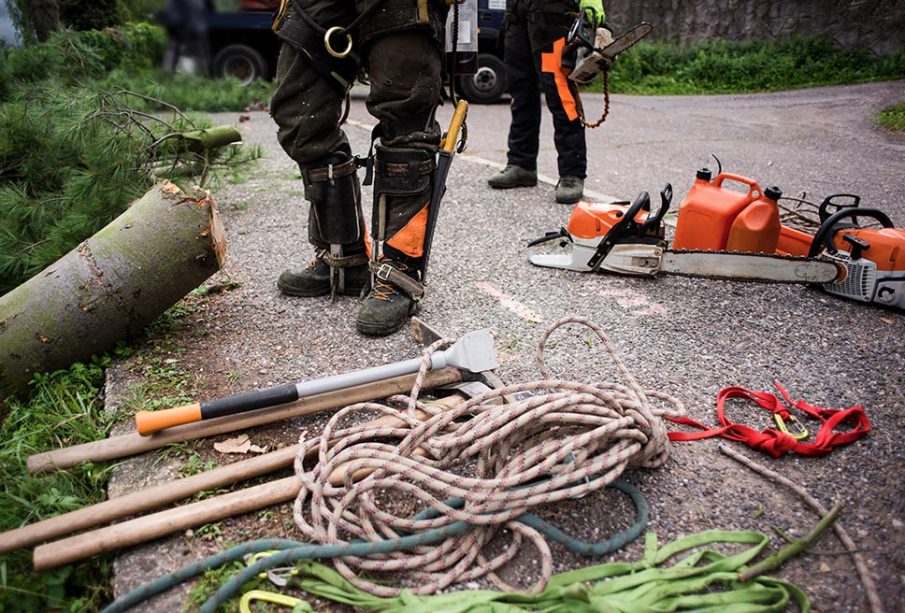How do I become a certified arborist in Australia? How much do arborists get paid in Australia? Are arborists in demand in Australia?

If you’re a big fan of climbing trees and being amongst the great outdoors, a career as an arborist in Australia can be both fulfilling and financially rewarding.
Arborists play a crucial role in tree care, maintenance, and preservation, ensuring the health and safety of our green spaces. In this article, we’re going to look at how to become a certified arborist in Australia, what sort of money you can earn, and whether or not arborists are currently in demand.
Want to learn more? Let’s take it from the top…

How do I become a certified arborist in Australia?
So, where does one begin if they want to qualify as an arborist in Australia?
To get there you’ll need some formal education, practical experience, and the appropriate certification:
- Education: You’ll need to obtain a relevant qualification in arboriculture or a related field (e.g., Diploma of Arboriculture or an Environmental Preservation / Sciences degree). There are many options for you to choose from in this regard. In some cases, you can learn on the job instead and still qualify, however, you’ll need at least 3 years.
- Practical Experience: Having hands-on experience in the field of arboriculture is critical for becoming fully-fledged. You can join apprenticeships with established, professional arborists and work your way up.
- Certification: You’ll also need to become certified in a variety of important skills, including health & safety, operating heavy machinery, and working at heights.
- Continuing Education: Continuous learning is crucial for professional growth and maintaining licensing/certification.
How much do arborists get paid in Australia?
Now onto the important thing: how much do arborists get paid in Australia?
The salary of an arborist in Australia can vary depending on various factors such as experience, qualifications, location, and the type of employment (e.g., freelance, employed, or running your own business).
- The average salary for an Australian arborist is between $65,000 and $80,000 AUD per year.
Again, these are averages. You can earn more as you gain more experience, specialise in a specific field via further education, or by starting a business of your own.
In any case, as far as the average earnings go, arborists can enjoy a fairly decent quality of life on their competitive salaries.

Are arborists in demand in Australia?
If you are interested in exploring this career further, you’re likely wondering if arborists are even in demand. The good news is yes, arborists are in demand in Australia, here’s why:
- Urban Growth: As major cities in Australia continue to rapidly expand, the need for skilled arborists to manage and maintain trees in urban environments grows.
- Tree Preservation and Safety: Local councils, government bodies, and private organisations place are hot on tree preservation and ensuring public safety. This creates a continuous demand for world-class arborists.
- Environmental Awareness: With the growing awareness of trees and their immense importance in regard to mitigating climate change, enhancing biodiversity, and improving air quality, the demand for arborists soars.

Is being an arborist worthwhile? Is it a fun career?
Now that we know arborists are in high demand and can fetch a fairly healthy salary, what about job satisfaction? Is it a fun career?
The short answer is yes! Here’s why:
- Working with Nature: Arborists spend their days working outdoors, climbing trees, and surrounded by nature. If you enjoy being in natural environments and appreciate the beauty of trees, being an arborist will allow you to do so on a daily basis. It’s better than being cramped up in an office like sardines, right?
- Making a Positive Impact: Arborists play a vital role in preserving and maintaining trees, which contribute to the overall health of our local environment. By ensuring the safety and well-being of trees, arborists make a positive impact on the local community and the planet. In a way, you can think of arborists as being green-fingered heroes wielding chainsaws!
- Variety of Work: Arboriculture offers a diverse range of tasks and challenges. From tree pruning and removal, to diagnosing tree diseases and providing expert advice, each and every day will present new and exciting opportunities.
- Career Progression: With experience and additional certifications in arboriculture, you can progress in your career and take on more senior roles, such as becoming a consultant or (as mentioned earlier) starting your own arborist business. This provides endless opportunities for professional growth and autonomy.
- Job Satisfaction: For individuals who have a genuine passion for trees and the environment, being an arborist can bring a high level of job satisfaction. The ability to contribute to the preservation and care of trees, while working in a dynamic and ever-changing field, can be immensely fulfilling.
- Well-being: working outside in nature can be an excellent way to maintain your health and fitness levels. If you are interested in self-improvement, this is a career path that can support your lifestyle.
Remember, just because being an arborist can be fulfilling and an awful lot of fun, it doesn’t mean there aren’t any risks involved. In fact, tree maintenance and removal can be incredibly dangerous, which is why you must take regular health & safety training courses to ensure that you are fit and able to keep yourself, your team, and your clients safe from harm.

Conclusion
Ultimately, becoming a certified arborist in Australia is relatively straightforward. You’ll need a combination of education, practical experience, and certification to get started, but if you are determined to pursue this path, you shouldn’t have too much trouble.
All in all, we conclude that being an arborist is a worthy pursuit and ideal for those who are practical, physically fit, and relish the idea of being able to spend their working days outside in the sunshine, as opposed to being stuck behind a desk.
Did you find this article helpful? If so, we wish you the very best of luck with your future career.










